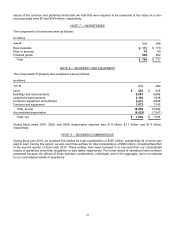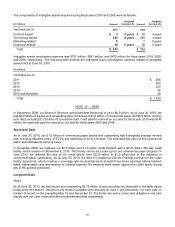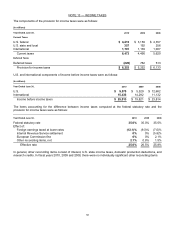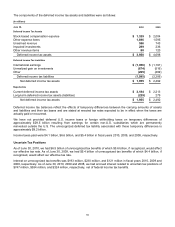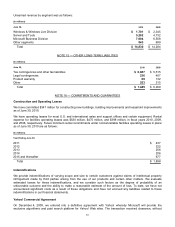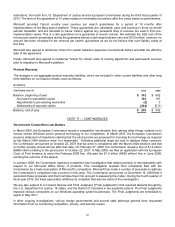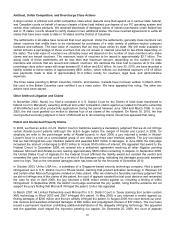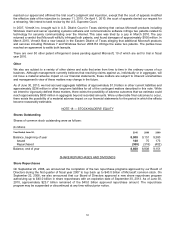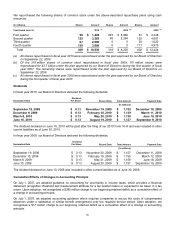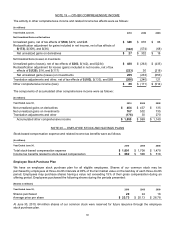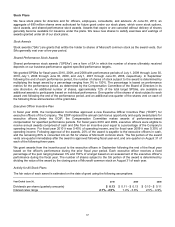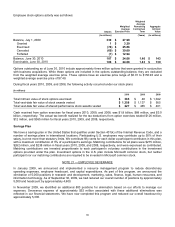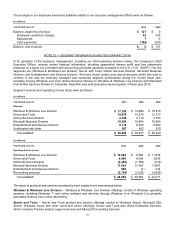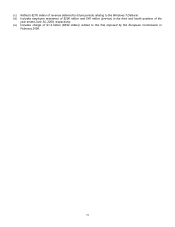Microsoft 2010 Annual Report Download - page 64
Download and view the complete annual report
Please find page 64 of the 2010 Microsoft annual report below. You can navigate through the pages in the report by either clicking on the pages listed below, or by using the keyword search tool below to find specific information within the annual report.63
Antitrust, Unfair Competition, and Overcharge Class Actions
A large number of antitrust and unfair competition class action lawsuits were filed against us in various state, federal,
and Canadian courts on behalf of various classes of direct and indirect purchasers of our PC operating system and
certain other software products. We obtained dismissals of damages claims of indirect purchasers under federal law
and in 15 states. Courts refused to certify classes in two additional states. We have reached agreements to settle all
claims that have been made to date in 19 states and the District of Columbia.
The settlements in all states have received final court approval. Under the settlements, generally class members can
obtain vouchers that entitle them to be reimbursed for purchases of a wide variety of platform-neutral computer
hardware and software. The total value of vouchers that we may issue varies by state. We will make available to
certain schools a percentage of those vouchers that are not issued or claimed (one-half to two-thirds depending on
the state). The total value of vouchers we ultimately issue will depend on the number of class members who make
claims and are issued vouchers. The maximum value of vouchers to be issued is approximately $2.7 billion. The
actual costs of these settlements will be less than that maximum amount, depending on the number of class
members and schools that are issued and redeem vouchers. We estimate the total cost to resolve all of the state
overcharge class action cases will range between $1.9 billion and $2.0 billion. At June 30, 2010, we have recorded a
liability related to these claims of approximately $651 million, which reflects our estimated exposure of $1.9 billion
less payments made to date of approximately $1.2 billion mostly for vouchers, legal fees, and administrative
expenses.
The three cases pending in British Columbia, Ontario, and Quebec, Canada have not been settled. In March 2010,
the court in the British Columbia case certified it as a class action. We have appealed this ruling. The other two
actions have been stayed.
Other Antitrust Litigation and Claims
In November 2004, Novell, Inc. filed a complaint in U.S. District Court for the District of Utah (later transferred to
federal court in Maryland), asserting antitrust and unfair competition claims against us related to Novell’s ownership
of WordPerfect and other productivity applications during the period between June 1994 and March 1996. In June
2005, the trial court granted our motion to dismiss four of six claims of the complaint. On March 30, 2010, the trial
court granted summary judgment in favor of Microsoft as to all remaining claims. Novell has appealed that ruling.
Patent and Intellectual Property Claims
In 2003, we filed an action in U.S. District Court in California seeking a declaratory judgment that we do not infringe
certain Alcatel-Lucent patents (although this action began before the merger of Alcatel and Lucent in 2006, for
simplicity we refer to the post-merger entity of Alcatel-Lucent). In April 2008, a jury returned a verdict in Alcatel-
Lucent’s favor in a trial on a consolidated group of one video and three user interface patents. The jury concluded
that we had infringed two user interface patents and awarded $367 million in damages. In June 2008, the trial judge
increased the amount of damages to $512 million to include $145 million of interest. We appealed that award to the
Federal Circuit. In December 2008, we entered into a settlement agreement resolving all other litigation pending
between Microsoft and Alcatel-Lucent, leaving approximately $500 million remaining in dispute. In September 2009,
the United States Court of Appeals for the Federal Circuit affirmed the liability award but vacated the verdict and
remanded the case to the trial court for a re-trial of the damages ruling, indicating the damages previously awarded
were too high. Trial on the remanded damages claim has been set for the first week of December 2010.
In October 2003, Uniloc USA Inc., a subsidiary of a Singapore-based security technology company, filed a patent
infringement suit in U.S. District Court in Rhode Island, claiming that product activation technology in Windows XP
and certain other Microsoft programs violated a Uniloc patent. After we obtained a favorable summary judgment that
we did not infringe any of the claims of this patent, the court of appeals vacated the trial court decision and remanded
the case for trial. In April 2009, the jury returned a $388 million verdict against us, including a finding of willful
infringement. In September 2009, the district court judge overturned the jury verdict, ruling that the evidence did not
support the jury’s finding that Microsoft infringed the patent. Uniloc has appealed.
In March 2007, i4i Limited Partnership sued Microsoft in U.S. District Court in Texas claiming that certain custom
XML technology in Word 2003 and 2007 infringed i4i’s patent. In May 2009, a jury returned a verdict against us,
finding damages of $200 million and that we willfully infringed the patent. In August 2009, the court denied our post-
trial motions and awarded enhanced damages of $40 million and prejudgment interest of $37 million. The court also
issued a permanent injunction prohibiting additional distribution of the allegedly infringing technology. We appealed
and the appellate court stayed the injunction pending our appeal. On December 22, 2009, the court of appeals



